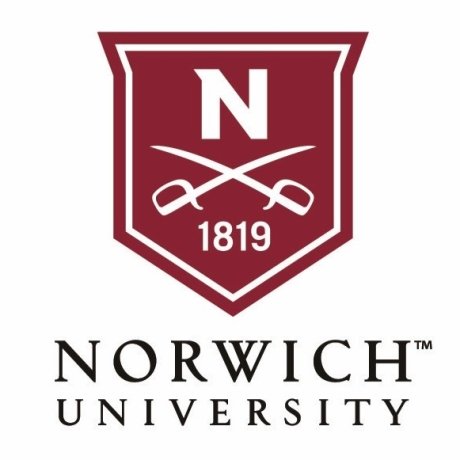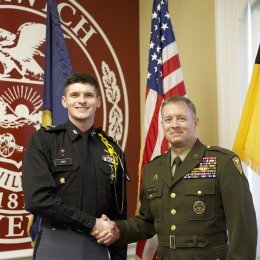Center for Career Readiness offers resources for Norwich University students of any class year
NORTHFIELD, Vt. — Job-market-eyeing juniors and seniors have probably visited Norwich University’s Center for Career Readiness to get résumés and cover letters reviewed, practice interviewing and explore work-experience opportunities. But the center’s director, Meghan Oliver, wants first-year students, who may not yet have visited, to know it’s never too early to tap resources and plan careers.

NORTHFIELD, Vt. — Job-market-eyeing juniors and seniors have probably visited Norwich University’s Center for Career Readiness to get résumés and cover letters reviewed, practice interviewing and explore work-experience opportunities. But the center’s director, Meghan Oliver, wants first-year students, who may not yet have visited, to know it’s never too early to tap resources and plan careers.
Recent news reporting suggests Generation Z, the age cohort comprising most of Norwich University’s undergraduate classes, will be able to seize new opportunities, some created by the exit of baby boomers who, as Pew Research reported, were among the 3.3 million people who retired in 2020’s third quarter. And, if they follow the example of the millennials, who Gallup identified as open to emerging opportunities and likely to switch careers, Gen Z will probably wear many hats.
“We talk to students (and ask) about why are they here, what is their purpose for going to college and what is their plan for when they go through college.”Meghan Oliver, director, Norwich University Career and Internship Center
Oliver, who succeeded 27-year center director Kathryn Provost in August, said new Norwich students can explore career options immediately.
Forbes magazine suggested Gen Z will roll with uncertainty. This past fall, Forbes columnist Mark C. Perna, who called Gen Z “Generation Resilient,” cited a four-country survey by British education services provider Pearson that showed 80% of 6,000 Gen Z college students polled said coronavirus pandemic adversity made their generation more resilient.
“We talk to students (and ask) about why are they here, what is their purpose for going to college and what is their plan for when they go through college,” Oliver said. “How are they going to make the most of this experience so that it can propel them in to a career of their choice or even their first job so they know how to manage their career from their first job to their last job.”
Oliver said she and her Center for Career Readiness colleagues Jim Graves, Kat Collins and Angel Wood and a collection of peer counselors use mind mapping, group sessions and one-on-one meetings to help students explore who they are, what they like to do, what their skills are and how skills intersect with values.
Finding the path
Instant answers aren’t required, Oliver said; the idea of immediately picking the perfect major leading to the perfect rest-of-life job is fantasy. The better tack, she said, is mastering flexibility, so that when students change jobs, or companies, the transition is fluid and less debilitating.
Transferrable skills lie in places students may not expect, Oliver said; history majors learn critical thinking, writing and trend spotting — they see how past trends might affect the future.
Oliver said she and the center help students find high-impact experiences — full internships, job shadowing, microinternships and civic engagement (working with the Center for Civic Engagement). Oliver said her office will again seek a Vermont Labor Department grant to fund a van to bring students to off-campus internships.
Admissions Director Steve Wolf, a retired U.S. Marine Corps colonel, said the Career and Internship Center’s resources help students build personal connections as they build skills. As the adage goes, who you know can matter as much as what you know.
“Guidance and programs provided by the Career and Internship Center can help (students) find the right career … gain practical experience in that career … (and) build their network of connections by leveraging our alumni,” he wrote in an email. “When combined, these factors enable our graduates to hit the ground running in a career they are passionate about right after graduation.”
The road to graduation starts at orientation, Oliver said. There, Career and Internship staff members will share their own stories of perseverance to help students skirt future pitfalls.
“I changed my major three times and transferred schools,” she said. “I tried to do it all myself and I wasted time and spent more money because I didn’t ask for help.”
With the unemployment rate historically low — the U.S. Labor Department on Dec. 29 reported the lowest four-week moving average of weekly jobless benefits claims since October 1969 — opportunities abound for job seekers, Oliver said. Employers have called her office daily over the past several months to recruit Norwich University students and alumni.
“Our career fair on March 23 will likely have a record number of employers across all industries,” Oliver said. “We also have individual recruitment events throughout the semester in a variety of industries. All students and alumni should take advantage of the recruiting opportunities our office has to offer.”
* * *
About Norwich University
Norwich University is a diversified academic institution that educates traditional-age students and adults in a Corps of Cadets and as civilians. Norwich offers a broad selection of traditional and distance-learning programs culminating in Baccalaureate and Graduate Degrees. Norwich University was founded in 1819 by Captain Alden Partridge of the U.S. Army and is the oldest private military college in the United States. Norwich is one of our nation's six senior military colleges and the birthplace of the Reserve Officers’ Training Corps (ROTC). www.norwich.edu
Read More

Dominick Dawes '04 Returns to Lead Norwich Men’s Hockey
Alumnus Dominick Dawes ’04 hired as the 12th Head Coach in the 116-year history of the NU Men's Ice Hockey program.

Vermont Governor Phil Scott announced as 2025 graduation speaker
Governor Phil Scott will be featured as this year's commencement speaker on The Hill during the 2025 spring ceremony.

Commandant Announces Regimental Commander for AY 2025-26
BG William F. McCollough, VSM, Commandant and Vice President for Student Affairs, Norwich Class of 1991, has announced that Cadet First Sergeant Matthew S. Ober '26 will serve as the Regimental Commander for the academic year 2025-26. This position is the highest rank among cadets in the Corps.
